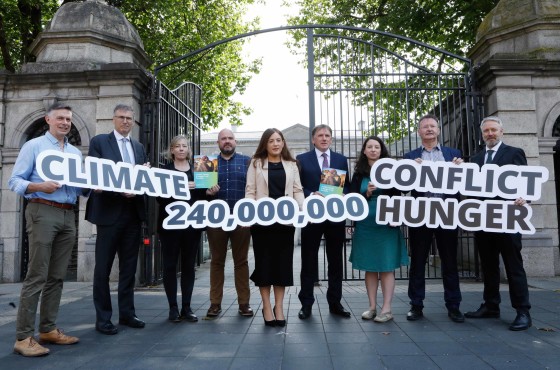Dóchas Calls for Urgent Irish Leadership as Multiple Humanitarian Crises Worsen Across the Globe

21 Nov 2023
Appearing before the Joint Committee on Foreign Affairs and Defence today, Dóchas, the Irish Network for Humanitarian and Development NGOs, called on the Irish Government to urgently scale up its humanitarian funding to those on the frontline of multiple humanitarian crises across the world, including in Gaza and in Sudan.
In her opening statement to the committee, CEO of Christian Aid Ireland and Chair of Dóchas, Rosamond Bennett emphasized the pivotal role played by Ireland in co-facilitating a Political Declaration calling for renewed commitment to achieving the Sustainable Development Goals at the UN in September but that now needs to be put into action at home.
She said “This is an important global wake-up call, in which Ireland played a crucial role. But we have not yet seen this same level of ambition here, including in Budget 2024. The additional allocation of €60m in Official Development Assistance (ODA) through the Department of Foreign Affairs is welcome, but unfortunately it lags behind both increasing humanitarian needs, driven by conflict, climate and hunger, as well as our own long-standing commitment to provide 0.7% of GNI in Official Development Assistance (ODA.”
Highlighting the unprecedented climate disasters of 2022, Ms. Bennett also emphasized the need for a dedicated Loss and Damage Fund (LDF), acknowledging the disproportionate impact on poorer nations. With COP28 approaching, she called on Ireland to support a fund that ensures accountability and compliance with core principles of equity and historic responsibility.
Ms Bennett was accompanied at the hearing by Finola Finnan, Director of Global Programmes and Deputy CEO of Trócaire, and Dominic MacSorley, Humanitarian Ambassador with Concern Worldwide.
Speaking in relation to the conflict in Israel and Gaza Ms. Finnan said "As the people of Gaza endure collective punishment, the blocking of aid, indiscriminate bombing and the destruction of schools and hospitals, the failure of many world leaders to call for a ceasefire is shocking and unjustifiable. I call on Irish leaders to use all available influence to secure a ceasefire. Every day will be felt in lost lives in Gaza.
She continued, "Trócaire condemn in the strongest terms the violations of international law that are being perpetrated with impunity by all parties to the conflict and call for an immediate ceasefire."
During his presentation Concern’s interim Country Director for Sudan, Dominic MacSorley, described the widespread destruction and looting of health facilities he witnessed during his visit last week to West Darfur, Sudan. But he noted: “The channels for humanitarian assistance are there. Access isn't easy, trucking is costly but these channels are being strengthened and need to be supported. The fact that the $2.6 billion needed to support at least 18 million people is less than 35% funded is completely unacceptable.”
He concluded his presentation saying “Twenty years ago I was privileged to lead Concern's response in Darfur. Back then Darfur grabbed the sustained attention of the media and the donors. Today the next generation is going through the same living hell except this time , they feel largely abandoned. We can and must change this.”
The Dóchas representatives at the hearing commended Ireland's new €14 billion fund for climate, nature, and infrastructure projects, expressing hope for a similar fund targeting communities in the Global South. Urging Ireland to uphold its reputation for solidarity, those present stressed the importance of ambitious and urgent action to prevent the reversal of decades of progress towards ending poverty and hunger.
In urging immediate action, the Dóchas representative conveyed the essential role of Ireland in leveraging its ODA budget and diplomatic weight to make a genuine impact on the lives of those most affected by conflict, climate change, and hunger.
They made a series of requests to the committee to help achieve this as follows:
- To make good on Ireland’s commitment to spend 0.7% of GNI on ODA by 2030 at the latest, and to ensure that those increases to reach 0.7% are targeted on those furthest behind in least developed countries and small island states, and those worst affected by climate change and conflict.
- To urgently scale-up Ireland's humanitarian funding to local organisations on the frontline of response in conflict-affected and fragile contexts, such as in Sudan and Gaza, recognising that funding must be underpinned by policies that contribute to addressing the root causes of crises.
- To advocate strongly, both domestically and at the EU level in particular, for an immediate ceasefire in Gaza, and ensure protection of civilians, urgent humanitarian access, and accountability for all violations of international law.
- To increase the focus on Sudan at EU level to address the devastating crisis in Sudan, to advocate for humanitarian access to those affected and those displaced, and to urgently scale up funding to respond to the many millions in need.
- Ahead of COP28, to act on climate change at all levels, including delivering on existing climate finance commitments at a minimum, with a view to rapidly increasing this allocation in response to the actual needs of low-income countries and in line with Ireland’s fair share of global targets.
- To make an initial pledge to help kickstart the new, dedicated Loss and Damage Fund (LDF) at COP 28, alongside our EU partners, and commit to developing a pathway to delivering our fair share of Loss and Damage funding by 2030 at the latest, in line with best estimates of global need.
- Lead efforts to ensure that finance reaches those experiencing the worst impacts of climate change, including women farmers, small-scale farmers, fishers, pastoralists, and indigenous communities to deliver sustainable food systems.